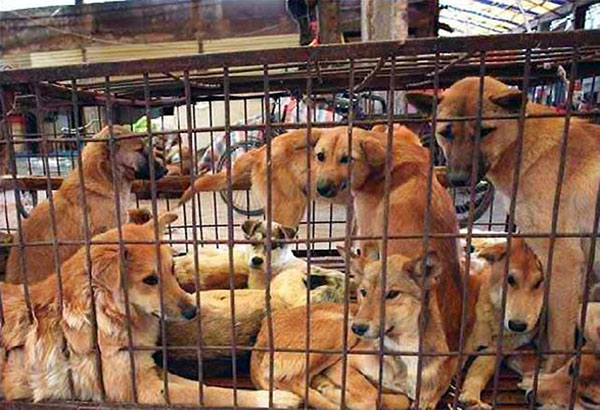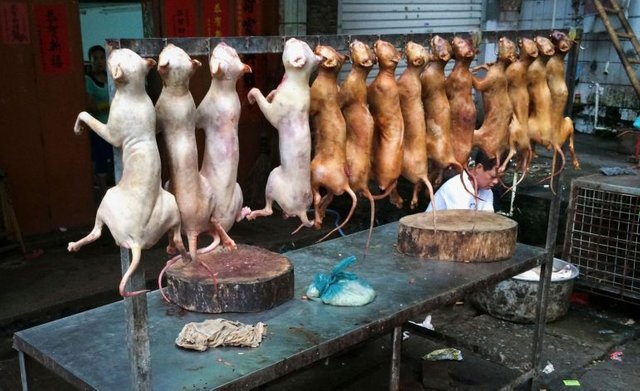Canine Meat Breeder in South Korea 🐕
Canine Meat Breeder in South Korea
I have heard of a controversy around the Olympic Games, indeed, there were problems with the fact that in some restaurants around the games were used dog meat, which shocked many people.

In South Korea, there are dog farms to be eaten.
Labradors, beagles or bastards are raised in very bad conditions.
Several farmers have agreed, against compensation, to close their establishment. Compensation was paid by the Humane Society International (HSI), an association headquartered in the United States.
The exact amounts are confidential but the transactions are in the hundreds of thousands of dollars, including adoption costs.
Calls to ban the consumption of dog meat, largely from abroad, are met with mixed reactions and even accusations of Western hypocrisy. Indeed, why could not we eat dog when we eat many cows that are sacred in India, pigs, who are pets in Asia and even horses, something completely unthinkable for a Korean.
It is estimated that South Koreans consume about one million dogs each year. It is a delicate dish that can be enjoyed in summer. Red and fatty meat, always boiled for tenderness, is considered energetic.
But tradition is lost. Dogs are more and more popular, but as pets and eating their meat is already a taboo among young South Koreans.
Animal advocates have redoubled their efforts to ban consumption. Campaigns that provoke heated debate, many South Koreans denouncing a double standard cultural measures.
One-fifth of the 50 million South Koreans have a pet, mostly cats and dogs, but for many dogs are no more special than lambs or rabbits.
A debate that is found in other Asian societies consuming dogs, as in China, where the festival of canine meat Yulin attracts crowds to the chagrin of Western critics.
The Yulin Dog Meat Festival is a festival held every June 21 in Yulin, Guangxi Province, China. It is dedicated to dog and cat meat.

Taiwan banned canine meat consumption in April, with mixed reactions.
The opinion is divided in South Korea, as evidenced by the polls.
While 70 per cent of South Koreans do not eat dogs, only 40 per cent say they do not eat dogs. According to this recent poll, 65% of them want dogs to be bred and slaughtered in better conditions.
There is no law regulating the slaughter of dogs in South Korea. Farmers are asking the government to subject the sector to the same regulations as livestock, but animal advocates demand its abolition outright.
Some dogs are raised in cages of about two square meters for two dogs in the stench of excrement. They can spend up to a year before going to the slaughterhouse.
For many, no animal should suffer such conditions.
Canine rescue operations are among the most expensive initiatives. The stages of the closure of the farms are put online live to encourage donations.
Some do not understand why associations are putting so much energy into saving dogs when they are not struggling so much to save cows or pigs. Is it the law of one saves the cutest and ugly we do not care?
Closure of the largest dog meat market in South Korea

The Moran Market in Seongnam, located southeast of Seoul, is a place highly regarded for its dog meat. More than 80,000 dogs were sold dead or alive year-round, providing nearly one third of the 100,000 tons of canine meat consumed in the country of calm morning.
The traders had to suspend the slaughtering activities, then remove the cages since May 2017.
In return, the traders are accompanied in their professional reconversion, and have help and financial support from the town hall.
Among the most virulent critics of the festival, besides the fact that the animals in question are dogs and not chickens or oxen, animal rights activists also point to slaughter conditions: The latter would be extremely brutal, the dogs would be hanged, skinned alive, beaten or electrocuted.
Some argue that, to enjoy the medicinal properties of dog meat, it is traditionally necessary to make the animal suffer as long as possible during slaughter, in order to improve the meat. To do this, it would break his limbs, skin alive while trying to keep it alive for as long as possible, to multiply nutrients and give more pleasure in the mouth.
Oh my god, it's horrible, how can we do something like that !!
Fortunately, these methods are not really common in Korea but in other countries.
Most South Korean canker butchers use electrocution, captive shotguns and methods similar to those used for slaughtering other animals. They do not have time to torture dogs given the high demand and electrocution is a faster and more cost effective way.
Be that as it may, one thing is certain: the dogs are held in rather dubious conditions, in cages too small and in the middle of their own droppings. This is also the case for other animals, but it turns out that the dog meat trade, in particular, is not too much of the taste of tourists.
The decision to abolish the Moran Market might be less motivated by animal concern than purely diplomatic reasons. Indeed, there is no indication that the dog meat trade will be eliminated in South Korea, however, the closure of this market that particularly attracts the spotlight makes it possible to perform a symbolic gesture, to restore a little an image tarnished by this controversial practice.
In the land of new technologies, the world's twelfth largest economic power, we do not want a practice perceived as archaic by Westerners to tarnish the glory of gleaming industry, computer technology and ultra-fast internet speed! Moreover, this is not the first time that these small disturbing defects are masked, indeed, almost 30 years ago, in 1988, during the Summer Olympics, the Seoul government had already censored restaurant cards all dog based dishes.
AJ picked your post @lndesta120282 for his #TOP5 FOOD POST. Visit AJ's FOOD ROUNDUP to view where your post is ranked.

I often heard about the fact that Koreans love to eat dogs and I think that this is terrible. I can not imagine that poor dogs are grown as whole farms.
A dog is a friend of a person. A dog is the most faithful alive on the planet, unlike a person, it will never sell you for any money. How many stories exist about how the dogs saved people, saved small children during the Second World War. The dogs sacrificed their lives for the sake of man.
I feel sorry for these poor dogs who spend their entire lives in a cage and die for food.
That is terrible.The Dogs shouldn't have been treated badly.They have life to live too.
It's so sad. I'm not one to tell other cultures what to do, and I do eat small amounts of meat so it's a bit hypocritical to say, but look at those beautiful faces. Dogs (and cats) are so close to their human companions. They might be a different species, but there is so much cross species understanding and connectedness since cats and dogs have been domesticated. I wonder how anyone could treat them with such contempt.
oh my god
I can not hear this before
They want animal to suffer as long as possible during slaughter, in order to improve the meat.
Oh my god, it's horrible, How Can they do that?
@indesta120282 I don't think they are humans, They are stupid people!
So Sad.
BTW, Thanks for letting us know.
Dogs should just be pets
Esto es ganado para ellos, Dios perdonalos.
Dogs are great pets and companions, with so many other animals out there why eat something that can protect or comfort someone?
I’m sure they have many other options, especially between seafood and chickens, pigs and such.
Had dogs all my life and can’t say I would want to eat one.
@indesta120282
"While 70 per cent of South Koreans do not eat dogs, only 40 per cent say they do not eat dogs."
Can u plzz explain me this lines